 Nadine McInnis is the author of seven books, including the fiction collection, Quicksilver (Raincoast), which was nominated for the 2002 Danuta Gleed Award, The Writers Craft Award, and the Ottawa Book Award, as well as five poetry collections: Shaking the Dreamland Tree (Coteau), The Litmus Body (Quarry Books), which won the Ottawa Book Award and was short-listed for the Pat Lowther Award, Hand to Hand (Polestar), First Fire / Ce feu que dévore (Vermillon/Buschek Books),which was short-listed for the Ottawa Book Award and the Archibald Lampman Award, and Two Hemispheres (Brick Books, 2007). She’s also published Poetics of Desire (Turnstone), a critical study of the love poetry of Dorothy Livesay.
Nadine McInnis is the author of seven books, including the fiction collection, Quicksilver (Raincoast), which was nominated for the 2002 Danuta Gleed Award, The Writers Craft Award, and the Ottawa Book Award, as well as five poetry collections: Shaking the Dreamland Tree (Coteau), The Litmus Body (Quarry Books), which won the Ottawa Book Award and was short-listed for the Pat Lowther Award, Hand to Hand (Polestar), First Fire / Ce feu que dévore (Vermillon/Buschek Books),which was short-listed for the Ottawa Book Award and the Archibald Lampman Award, and Two Hemispheres (Brick Books, 2007). She’s also published Poetics of Desire (Turnstone), a critical study of the love poetry of Dorothy Livesay.1 - How did your first book change your life?
When my first book was published, I had just left rural Saskatchewan. I was suffering from acute dislocation even though I had come home. I remember being very bothered by streetlights at night. And the book reflects my struggles with ghosts once again grown strong. Instead of driving a stake through the heart of the past, that book fed blood to the phantoms. I remember feeling very depleted. I never had that experience with any other book.
2 - How long have you lived in Ottawa, and how does geography, if at all,impact on your writing? Does race or gender make any impact on your work?
I’ve been back in Ottawa for twenty years. Landscape is essential to all my writing, but I respond strongly to different kinds of landscapes: peaceful ease on the prairies, uneasy awe to the Maritime seascape of all my ancestors, and with such complex feelings to the urban and geologic reality of central Canada that this must be my most significant landscape. The rivers here, the hills to the north of the city, the bog and green space, but also the urban landscape of parking lots and hospitals and suburbs, interest me a great deal.
My gender is one of the most important influences because I’ve always been interested in the experiences of the body: sexuality, fertility, illness, aspects of appetite.
3 - Where does a poem or piece of fiction usually begin for you? Are you an author of short pieces that end up combining into a larger project, or are you working on a "book" from the very beginning?
I don’t start with any idea for a book. The first half of what turns out to be a book is tentative. Once I see what I’m writing about, the ideas flow more coherently.
When my first book was published, I had just left rural Saskatchewan. I was suffering from acute dislocation even though I had come home. I remember being very bothered by streetlights at night. And the book reflects my struggles with ghosts once again grown strong. Instead of driving a stake through the heart of the past, that book fed blood to the phantoms. I remember feeling very depleted. I never had that experience with any other book.
2 - How long have you lived in Ottawa, and how does geography, if at all,impact on your writing? Does race or gender make any impact on your work?
I’ve been back in Ottawa for twenty years. Landscape is essential to all my writing, but I respond strongly to different kinds of landscapes: peaceful ease on the prairies, uneasy awe to the Maritime seascape of all my ancestors, and with such complex feelings to the urban and geologic reality of central Canada that this must be my most significant landscape. The rivers here, the hills to the north of the city, the bog and green space, but also the urban landscape of parking lots and hospitals and suburbs, interest me a great deal.
My gender is one of the most important influences because I’ve always been interested in the experiences of the body: sexuality, fertility, illness, aspects of appetite.
3 - Where does a poem or piece of fiction usually begin for you? Are you an author of short pieces that end up combining into a larger project, or are you working on a "book" from the very beginning?
I don’t start with any idea for a book. The first half of what turns out to be a book is tentative. Once I see what I’m writing about, the ideas flow more coherently.
4 - Are public readings part of or counter to your creative process?
Public readings aren’t that important to my creative process, but it can be lovely to feel a connection with listeners. I’m a much more visual person than an auditory person and often find it difficult to follow at readings. I prefer to be alone with a book, yet I’ve discovered poets I didn’t know by going to readings. I guess this roundabout answer reflects my ambiguous feelings. I wish I loved readings more and could bask in the sense of shared experience. I also wish I could dance without inhibition. Readings are really performances, which is the opposite of the writing process, which is solitary.
Public readings aren’t that important to my creative process, but it can be lovely to feel a connection with listeners. I’m a much more visual person than an auditory person and often find it difficult to follow at readings. I prefer to be alone with a book, yet I’ve discovered poets I didn’t know by going to readings. I guess this roundabout answer reflects my ambiguous feelings. I wish I loved readings more and could bask in the sense of shared experience. I also wish I could dance without inhibition. Readings are really performances, which is the opposite of the writing process, which is solitary.
5 - Do you find the process of working with an outside editor difficult or essential (or both)?
Editors are your best friend when they’re good at what they do. Editing takes incredible skill and generosity of spirit. Mostly, I’ve been lucky.
Editors are your best friend when they’re good at what they do. Editing takes incredible skill and generosity of spirit. Mostly, I’ve been lucky.
6 - After having published more than a couple of titles over the years, do you find the process of book-making harder or easier?
I trust the process more and let things unfold as they will so I guess it’s easier.
I trust the process more and let things unfold as they will so I guess it’s easier.
7 - When was the last time you ate a pear?
Today, because I read this question yesterday and the suggestive power of words is very potent.
Today, because I read this question yesterday and the suggestive power of words is very potent.
8 - What is the best piece of advice you've heard (not necessarily given to you directly)?
“This too shall pass,” which is the best reason for writing I’ve ever heard, and also the best response to suffering.
9 - How easy has it been for you to move between genres (poetry to fiction to non-fiction)? What do you see as the appeal?
Fiction and poetry seem to use different parts of the brain. Usually I write one or the other exclusively for a period of time. My desire to write fiction emerged in my thirties after a period of intense introspection when I was sick of myself. Fiction wasn’t about me, me, me and that was such a relief. At the same time, my poetry was becoming more out-turned, taking on some of the qualities of fiction. I particularly like dialogue and found the interaction between characters engaging. But I had to learn and unlearn writing habits to be able to move between poetry and fiction. Poets can rely more on certain flourishes of language. The reader is conscious of the poet throughout and can enjoy what the poet can do with language or with ideas. The pleasure of fiction often resides in the ability to forget the author is even there. I had to learn how to get out of the way.
10 - What kind of writing routine do you tend to keep, or do you even have one? How does a typical day (for you) begin?
I write when I’m drawn to write and usually something is gathering momentum in the back of my mind for a while before I start actively throwing out the fishing line. Observing, musing, laughing at stories people tell you, letting your dreams and deeper sleep states do their mysterious work are all part of writing, so it’s hard to talk about a routine. In a way, those of us who write are always writing. Maybe this comes from having done so much writing in my head while I was pushing strollers. I remember these experiences as happy instead of frustrating, and my children have both grown into people who love to sit quietly and think as they move through time and space. They’ve been excellent travelers.
11 - When your writing gets stalled, where do you turn or return for (for lack of a better word) inspiration?
Playing the harp clears away cobwebs when I’m stuck. Wood vibrates against my shoulder in such an effortless way that I’m freed from words. Usually it’s best to walk away and leave a piece of writing alone, sometimes for years. Then what I was trying to write works itself out without the interference of my ego. Or not, in which case I can abandon it. One is drawn to explore experiences one doesn’t fully understand. That’s why the images are there, the atmosphere, the sense of something trying to pull together. If you’re lucky, the philosopher and craftsperson catch up. In the meantime, make music, or throw colour, or walk through a blizzard.
12 - How does your most recent book compare to your previous work? How does it feel different?
Two Hemispheres is more direct and urgent. I was deeply moved by the photos of the women in the Surrey County Lunatic Asylum and wanted to engage with them, to give them my full attention. Writing that book was an act of love, for them, for my troubled family members, for myself and my immediate family and all people who struggle with darkness. As all people do who are not psychopaths.
Playing the harp clears away cobwebs when I’m stuck. Wood vibrates against my shoulder in such an effortless way that I’m freed from words. Usually it’s best to walk away and leave a piece of writing alone, sometimes for years. Then what I was trying to write works itself out without the interference of my ego. Or not, in which case I can abandon it. One is drawn to explore experiences one doesn’t fully understand. That’s why the images are there, the atmosphere, the sense of something trying to pull together. If you’re lucky, the philosopher and craftsperson catch up. In the meantime, make music, or throw colour, or walk through a blizzard.
12 - How does your most recent book compare to your previous work? How does it feel different?
Two Hemispheres is more direct and urgent. I was deeply moved by the photos of the women in the Surrey County Lunatic Asylum and wanted to engage with them, to give them my full attention. Writing that book was an act of love, for them, for my troubled family members, for myself and my immediate family and all people who struggle with darkness. As all people do who are not psychopaths.
13 - David W. McFadden once said that books come from books, but are there any other forms that influence your work, whether nature, music, science or visual art?
Nature is and has always been my element, my solace. Despite my Roman Catholic upbringing with its daily dogma and interminable ritual, I knew from my earliest age that I was a pagan.
Nature is and has always been my element, my solace. Despite my Roman Catholic upbringing with its daily dogma and interminable ritual, I knew from my earliest age that I was a pagan.
14 - What would you like to do that you haven't yet done?
Be completely comfortable in my own skin.
15 - If you could pick any other occupation to attempt, what would it be? Or, alternately, what do you think you would have ended up doing had you not been a writer?
My interest in people’s stories could have led me to being a therapist of some sort. But I also love trees and am quite happy alone so could have been a tree surgeon.
16 - What made you write, as opposed to doing something else?
The great solace I found in books. A solace so intimate, it was like whispering under the covers. All is right in the world when I’m absorbed in a book.
My interest in people’s stories could have led me to being a therapist of some sort. But I also love trees and am quite happy alone so could have been a tree surgeon.
16 - What made you write, as opposed to doing something else?
The great solace I found in books. A solace so intimate, it was like whispering under the covers. All is right in the world when I’m absorbed in a book.
17 - What was the last great book you read? What was the last great film?
I’ve been reading nonfiction lately. Two books come to mind: Heart of a Soldier by James Stewart, which traces the friendship of two men from their days serving in Viet Nam to September 11, 2001, when one of them dies in the World Trade Centre; and Into the Wild by Jon Krakauer, which follows the wayward travels of a young middle class man who eventually starves to death in an old school bus in the Alaskan wilderness. Both books are illuminating glimpses into male questing in the modern context.
The last wonderful movie was Away from Her, for the artistry, the acting and the Canadian landscape which is so absent from mainstream film.
18 - What are you currently working on?
I’m finishing up a collection of short fiction. Many of the stories are set in a hospice. I’m fascinated by that place between consciousness and unconsciousness, between being and not being.
I’ve been reading nonfiction lately. Two books come to mind: Heart of a Soldier by James Stewart, which traces the friendship of two men from their days serving in Viet Nam to September 11, 2001, when one of them dies in the World Trade Centre; and Into the Wild by Jon Krakauer, which follows the wayward travels of a young middle class man who eventually starves to death in an old school bus in the Alaskan wilderness. Both books are illuminating glimpses into male questing in the modern context.
The last wonderful movie was Away from Her, for the artistry, the acting and the Canadian landscape which is so absent from mainstream film.
18 - What are you currently working on?
I’m finishing up a collection of short fiction. Many of the stories are set in a hospice. I’m fascinated by that place between consciousness and unconsciousness, between being and not being.
 Colin Morton
Colin Morton


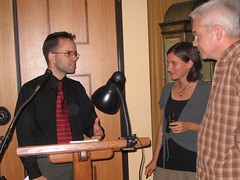
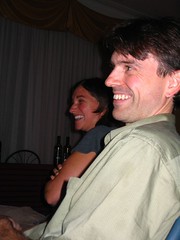
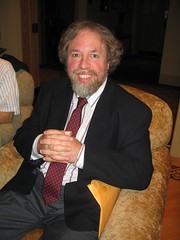
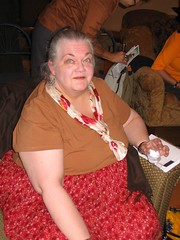
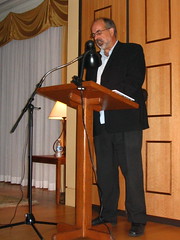
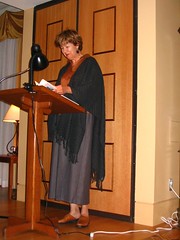
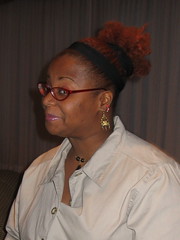
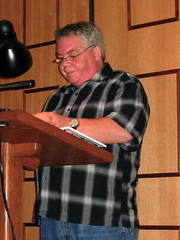
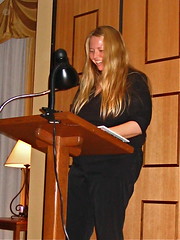
 John-James Ford
John-James Ford  Stephen Brockwell
Stephen Brockwell